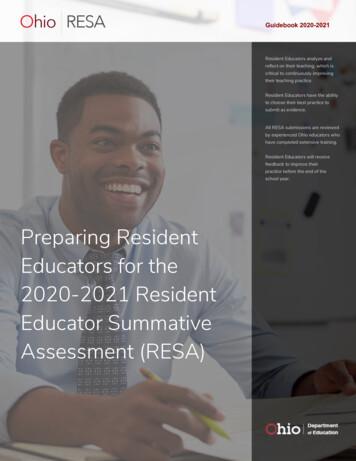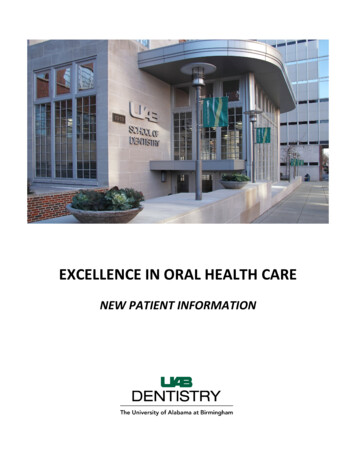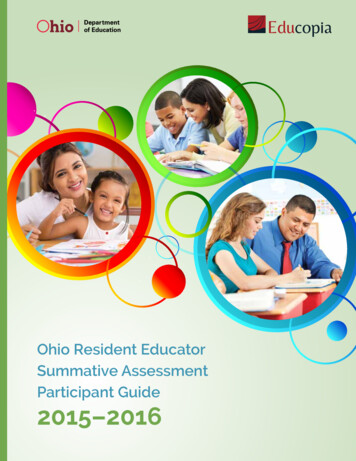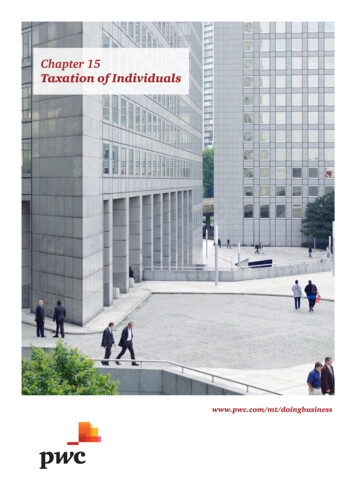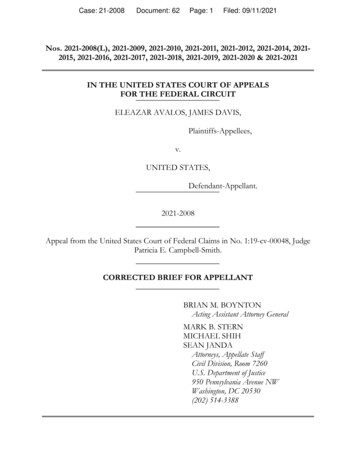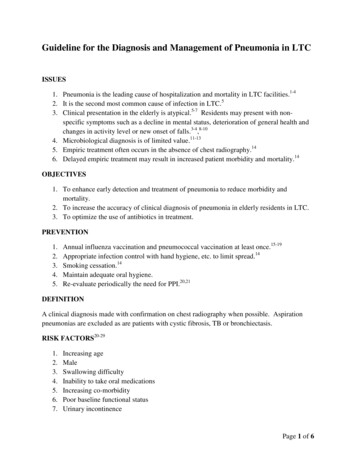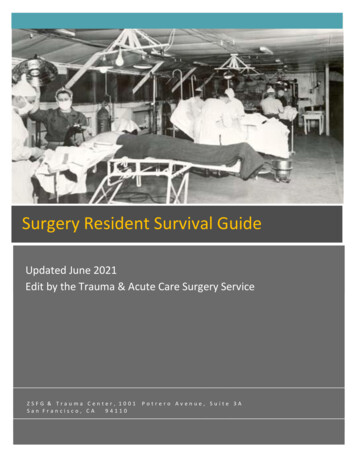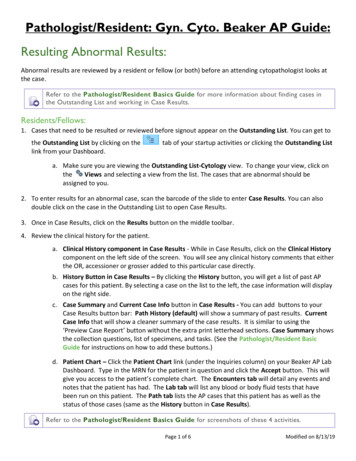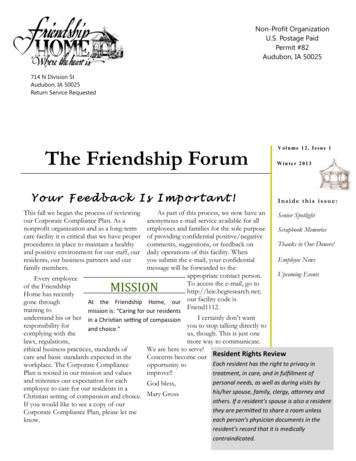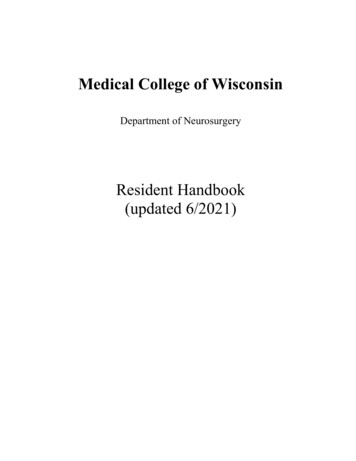
Transcription
Medical College of WisconsinDepartment of NeurosurgeryResident Handbook(updated 6/2021)
Introduction . 1Educational Goals . 1Application to the Program and Selection of Residents . 1Schedule Block . 2Resident Supervision . 3Transitions of Care/Hand-offs . 4Program Evaluation Committee/Clinical Competency Committee . 5Evaluation Process. 6-7Work Hours (Duty Hours) . 7-8Scheduling/Vacations/Traveling/Courses . 9-10Publishing Support . 10Moonlighting . 11Other Medical College of Wisconsin Affiliated Hospital Policies . 11ACGME Case Logs . 12ACGME Neurological Surgery Milestones . 13-20Conference Schedule . 21Outpatient Clinic. 22Facilities . 22Resources and Support . 22ADDENDUMSA.B.C.D.E.F.G.H.I.J.K.L.Epic Sign-Out Tool . 24-31CHW Resident – APP Handoff Guidelines . 32Outside Courses/Conference Request . 33Course/Conferences/Reimbursement & Travel . 34-35ACGME Case Log Minimums & Guidelines . 36-39Sick Policy . 40Dress Code Policy . 41Surgical Attire Policy (FMLH) . 42-45Pulling Residents Off Service . 46Rotation Goals and Objectives. 47-87Research Goals and Objectives . 88Journal Club Guidelines. 89M. Monthly EPIC/Case Log/SAP Report . 90N. SAP Instructions . 91-111O. New Innovations Instructions for Residents . 112-132
IntroductionThe Department of Neurosurgery at the Medical College of Wisconsin provides a broad-based subspecialty, hands-ontraining program. Residents are exposed to a large volume of clinical cases, covering the full depth and breadth ofneurosurgical practice. Operative experience begins early in training. This is supplemented by exposure to andinvolvement with internationally renowned neurosurgical researchers, utilizing our extensive departmental researchresources. This training takes place in a supportive, collegial atmosphere in a major Midwestern city. Our facilitiesinclude a nationally recognized children’s hospital, a large tertiary care center with an active trauma center, aVeterans’ Affairs Administration hospital that is a regional referral center, and exceptional departmental researchfacilities.The Neurosurgical Residency Program at the Medical College of Wisconsin is a seven-year program under thedirection of the Department of Neurosurgery, the Medical College of Wisconsin, and the Office of Graduate MedicalEducation. Graduates of this residency program have gone on to become leading clinicians and researchers in theprofession.Educational Goals of the ProgramThe primary goals of the Medical College of Wisconsin Neurosurgery Residency Program are to produceknowledgeable, skilled, safe, humanitarian, and collegial neurosurgeons that can contribute to their community and totheir profession. These men and women are bright, dedicated, and enthusiastic. Providing them with the knowledgeand experience necessary to achieve board certification and the education and training to master the six corecompetencies set by the ACGME, (Medical Knowledge, Patient Care, Practice-based Learning and Improvement,Systems-based Practice, Professionalism, and Interpersonal & Communication Skills), will allow the graduatingresident his or her choice of career pathway, including academic practice, private practice, or additional sub-specialtyfellowship training.Application to the Program and Selection of ResidentsOur program only accepts applications through the Electronic Residency Application Service (ERAS) and the match isdone through the National Residency Match program (NRMP). Details for each process are at their websites,https://students-residents.aamc.org/ and http://www.nrmp.org/. We accept applications from mid-September throughOctober. The Department reviews applications and offers invitations to interview to selected applicants. There arefour, one-day interview dates from which to choose. Candidates have the opportunity to have dinner with currentresidents the evening before their selected interview date. Interviews are usually in November and December eachyear.Candidates meet a number of faculty members on the day of the interview. They will also have a guided tour of thehospitals and research facilities. At the conclusion of candidate interviews, the faculty and residents discuss allcandidates based upon personal interviews and information provided in their application. The final rank list issubmitted to the NRMP for processing to match one or two positions per year. On Match Day, the Program Directorcontacts the matched candidate(s).1
Block ScheduleModel Rotation BlockPGY7654321Q1FMLH ChiefFMLH SrResearchVA SrFMLH JrNeurosciencesFMLH NS InternQ2FMLH ChiefVA ChiefResearchFMLH SrFMLH terventional/GKCHWFMLH JrFMLH NS InternQ4FMLH ChiefVA ChiefResearchElectiveInterventional/GKFMLH JrNCCFMLH Froedtert Memorial Lutheran Hospital, VA Veterans Administration Medical Center, GK GammaKnife, NCC Neurocritical Care,NS Neurosurgery, CHW Children’s Hospital of WisconsinThis Model Rotation Block is used as a guide for a resident’s training program. Rotations are adjustedbased on changes in Training Requirements, individual resident interests, and resident numbers. Beloware 2 rotation blocks of recent graduates that illustrate this flexibility.Actual Rotation Block APGY7654321Q1FMLH LH-NSIntern/NCC/TraumaQ2FMLH ChiefPEDS-NS/VA -NSFMLH-JRFMLH NSIntern/NCC/ENTQ3FMLH ChiefVA RFMLH-JR/PEDSGenSurg/PedsNS/AnesthesiologyQ4FMLH ChiefVA urologyActual Rotation Block BPGY76543Q1FMLH ChiefVA MLH ChiefVA ChiefResearchFMLH-SRFMLH-JR2 PEDS-NSNCC1 FMLH NSIntern/Gen SurgFMLH NSIntern/PedsGenSurg/NeurologyQ3FMLH ChiefVA nesthesia/GenSurg/NCCQ4ElectiveVA ChiefResearchFMLH SrPEDS-NSFMLH-NSNCC/PedsNS/ENT2
Resident SupervisionThe Neurosurgery Residency Program follows MCWAH’s Institutional Policy, Supervision of Housestaff, which is onthe MCWAH InfoScope site.Additional program-specific guidelines are as follows: Residents may perform inpatient or outpatient consultations on a routine or emergency basis. The residentwill communicate with the chief resident (if applicable) and supervising faculty regarding the patient'scondition and diagnostic studies to formulate treatment plans. The faculty will directly confirm theexamination and interpretation of imaging studies as needed. Communication with faculty should occur atthe time of initial consultation for critically ill or unstable patients, patients with unexpected deterioration,patients with need for ICU care, and patients under consideration of surgery, or when requested by patient orfamily members.Residents may perform daily assessment of hospitalized patients. Communication with faculty should occurfor critically ill or unstable patients, patients with unexpected deterioration of condition, patients with needfor ICU care, and patients under consideration of surgery, deaths, or when requested by patient or familymembers. Faculty will evaluate patients daily or more frequently as needed to confirm resident assessmentsand collaboratively establish treatment plans with the residents.No major or minor procedures are performed without discussion and approval of the attending physician.Residents may perform procedures when their skill level has been determined to be "independent" for theprocedure. Otherwise, the procedure must be directly supervised by the faculty, or by another resident withskill at the "instructor" level for that procedure.Patients requiring admission to the hospital must be discussed with the attending faculty as outlined above orwith the chief resident when above conditions do not apply.The resident will provide documentation of faculty participation in patient care in the medical record. Facultywill provide documentation of their participation in patient care in the medical record.All residents will comply with hospital policies and procedures as they pertain to patient care anddocumentation.In the Department of Neurosurgery, the default level of supervision is Direct, unless the patient’s attendingneurosurgeon has previously designated otherwise.3
Transitions of CareThe Neurosurgery Residency Program follows MCWAH’s Institutional Policy, Transitions of Care found on theMCWAH InfoScope site.Additional program-specific guidelines are as follows: Froedtert Memorial Lutheran Hospital:o Morning rounds - All in attendance will have an updated patient list printed daily each morning priorto beginning AM rounds. Overnight events/consults/operations/new patients and pertinentlab/radiology findings are discussed with FMLH chief, residents, rotating interns, medical students,etc. This is followed by rounds to see patients, discuss plans for the day, and integrate care with themid-level provider team. The chief and senior residents will communicate with the attendingneurosurgeons regarding their patients during this time and update the plans for each patient.Similar sessions of updating the patient list occur throughout the day between the residents and themid-level providers.o Evening sign-out -This will occur when the resident covering the night is available to meet with theFMLH resident holding the ‘hot’ pager. The chief resident will be available for plan updates andclarification. Each patient will be discussed in detail including events of the day, pertinent lab andradiology findings, and plans for the following day/future. The chief resident will contact theresident holding the pager for any updates if unable to attend the evening sign-out.o EPIC sign-out tool – Residents should use the Epic sign-out tool (See Addendum A)Children’s Hospital of Wisconsin/Clement J Zablocki VA Medical Center:o Weekdays - Designated CHW junior resident coverage from 5:30 AM to 5:30 PM unless CHWresident is post-call. Then this responsibility is assumed by the CHW PA staff during that day. VAcoverage: Monday through Friday during the day will be handled by the designated VA resident.o Weeknights - CHW resident/PA will sign out to on call resident at approximately 5:30 PM. Awritten handoff tool is maintained within the electronic medical record. The handoff will includeboth verbal and written transmission of information. Similar discussion will take place between theVA resident and the overnight on call resident. Overnight events/consults/new admits/surgeries arethen discussed in similar fashion the following morning between the overnight resident and thedesignated CHW/VA resident or CHW PA.o Weekends - On call resident is pager call for CHW and VA from Friday 6PM until Monday 6AM.Sign-out occurs between 5pm and 6pm. During weekends, the same resident will cover the VA aswell. Sign out from the VA resident will occur on Friday evening, usually via phone. Patientinformation including diagnosis, exam, pertinent lab and radiology findings, plan, and attendingphysician is shared for each patient. Similar sign-out will occur between the weekend resident andthe VA resident on Monday AM. The Monday CHW resident resumes care at 5 am on Monday.o Please see Addendum B. for hand-off guidelinesThe Neurosurgery Residency Program will assess residents on their utilization of the standardized transitions of careprocess and their communication skills using regularly administered departmental evaluations.Last reviewed: 6/2019, 12/2019, 6/20214
Program Evaluation Committee (PEC)The Neurosurgery Residency Program follows MCWAH’s Institutional Policy, Program Evaluation Committee on theMCWAH InfoScope site.Additional program-specific guidelines are as follows: Membership shall include the department chair, residency program director, associate program director, and asenior resident (who will serve a term of 1 year) and a mid-level resident.The PEC will meet at quarterly each year. Minutes of each meeting will be taken by the program coordinatorand distributed to all members.The PEC will:o plan, develop, implement, and evaluate the educational activities of the Neurosurgery Residencyprogram;o review and make recommendations for revision of curriculum goals and objectives;o address areas of non-compliance with the requirements of the Accreditation Council for GraduateMedical Education (ACGME),o conduct an annual program evaluation (APE) and monitor program progress in addressing areas inneed of improvement identified during the APE.Clinical Competency Committee (CCC)Programs must comply with the MCWAH policy, Clinical Competency Committee. Should there be a conflictbetween the MCWAH policy and the program information outlined below, MCWAH’s policy takes precedence. The program director appoints the Clinical Competency Committee.At a minimum, the Clinical Competency Committee is composed of three members of the program faculty,including the department chair and residency program director.o Others eligible for appointment to the committee include faculty from other programs and nonphysician members of the health care team.The responsibilities of the Clinical Competency Committee include:o review of all resident evaluations semi-annually;o preparation and reporting of Milestones evaluations of each resident semi-annually to ACGME;o advising of the program director regarding resident progress, including promotion, remediation, anddismissal.5
Evaluation ProcessThe Neurosurgery Residency Program follows MCWAH’s Institutional Policy, Evaluation of Housetaff on theMCWAH InfoScope site.Additional program-specific guidelines are as follows:1. Evaluation of ResidentsEvaluation of Residents by Neurosurgery Faculty (every six months)Every six months a resident evaluation form is sent to the Neurosurgery clinical faculty via New Innovations. Amilestone evaluation of all core competencies (patient care, medical knowledge, systems-based practice, practicebased learning and improvement, professionalism, and interprofessional and communication skills) is completed foreach resident based on their rotation-specific discipline over the past six months. Free text for refinement andelaboration is also collected. The numerical ratings are collated and trended. The completed evaluations are availableto each respective resident in New Innovations. The Clinical Competency Committee (CCC) then meets to review allevaluations. Other elements of the resident performance are reviewed including primary written board examination,conference attendance, research progress, teaching and administrative responsibilities. The resident operative logs forthe time-period are also reviewed. Based on all the information, milestone levels are set for each resident andsubmitted to the ACGME. The evaluations are reviewed with each resident individually by the program director anddocumented in the New Innovations review module. The completed reviews are available to each respective residentin New Innovations.Evaluations of Residents by Non-Neurosurgery Clinical Faculty (at the completion of non-neurosurgery clinicalrotations)One week before a resident completes a non-neurosurgery clinical rotation, the non-neurosurgery clinical facultyresponsible for the rotation receives an evaluation form via New Innovations software. A 10-point rating system forcore categories and free text for refinements and elaborations is used. The numerical ratings are collated and trended.The evaluations are discussed with the residents during the individual evaluation meetings with the program director.Evaluation of the residents by self, mid-levels and other staff.Every six months mid-levels and other staff are invited to evaluate each resident using a Allied Health-specific form inQualtrics. Residents evaluate themselves using a peer specific form in New Innovations. This information is collectedand reviewed by the CCC at their biannual meetings.ABNS Written Board ExaminationResidents will sit for the examination for self-assessment during the PGY-2 year. They will continue to take theexamination yearly for self-assessment until a passing score is attained. The following year they will take it for credit.The exam scores are reviewed by the CCC at their biannual meetings.2. Evaluation of Advanced Practice ProvidersResidents have the opportunity to evaluate APPs every six months in Qualtrics. Feedback received is shared withDepartment of Neurosurgery Administrators.6
3. Evaluation of FacultyBi-annually, residents perform anonymous evaluations of each of the faculty members via New Innovations software.The program director cannot determine which resident made any comments about a faculty. The tool includesnumerical ratings of core categories and free text for elaboration. The department chair and program director reviewthe results.4. Evaluation of ProgramAnnual program surveys are distributed to faculty and residents by 1) ACGME and 2) MCWAH. Results of eachsurvey are shared with faculty and staff. In addition, the program offers residents the option to participate in anIndependent Program Evaluation facilitated by a coordinator from another program. Anonymity is preserved in eachsurvey.5. Surgical Autonomy Program – See Addendum JFaculty and residents participate in the Surgical Autonomy Program (SAP) to evaluate assess competency, providefeedback and visualize progress of trainees in the OR. SAP also allows for feedback on instruction/teaching in the ORby clinical faculty.6. Loop ClosureBimonthly meetings are held with the all the residents (in a group) with the program director, associate programdirector, and program coordinator. Discussions regard anything related to the residency program, including, but notlimited to: rotations, policies, duty hours, on-call schemes, and conferences. In addition, the program director andassociate program director are respectively readily available throughout the year to address questions or concernsregarding program activities or personal issues.Work Hours (Duty Hours)The Neurosurgery Residency Program follows MCWAH’s Institutional Policy, Work Hours on the MCWAHInfoScope site.Additional program-specific guidelines are as follows:Residents are expected to log their hours in New Innovations within two days of working. A report is run on orabout 20th of each month to determine resident duty hours available for the remainder of the month. Residentswho have not updated their duty hours within 2 weeks may drop in vacation picking order.Maximum Hours of Clinical and Educational Work per Week Work hours must be limited to 80 hours per week, averaged over a four-week period, inclusive of all in-houseclinical and educational activities, clinical work done from home and all moonlighting.Mandatory Time Free of Clinical Work and Education Residents should have eight hours off between scheduled clinical work and education periods. Residents must have at least 14 hours free of clinical work and education after 24 hours of in-house call. Residents must be scheduled for a minimum of one day in seven free of clinical work and required education(when averaged over four weeks or month in a month-long rotation). At-home call cannot be assigned onthese free days.Maximum Clinical Work and Education Period Length7
Clinical and educational work periods for residents must not exceed 24 hours of continuous scheduled clinicalassignments.o Up to four hours of additional time may be used for activities related to patient safety, such asproviding effective transitions of care, and/or resident education. Additional patient care responsibilities must not be assigned to a resident during this time.Exceptions: In rare circumstances, after handing off all other responsibilities, a resident, on their owninitiative, may elect to remain or return to the clinical site in the following circumstances:o To continue to provide care to a single severely ill or unstable patient;o Humanistic attention to the needs of a patient or family; or,o To attend unique educational events.These additional hours of care or education will be counted toward the 80-hour weekly limitoodocument the reasons for remaining to care for the patient in question and submit that documentationin every circumstance to the program director. This should be documented in NewInnovations and the Program Director will review and if the violation is justified, it will be removedfrom the duty hour log.The program director will review each submission of additional service, and track both individualresident and program-wide episodes of additional duty.Maximum Frequency of In-House Night Float The Program does not currently use a night float system. However, should one be implemented:o Night float must occur within the context of the 80-hour and one day of in seven requirements.Maximum In-House On-Call Frequency Residents must be scheduled for in-house call no more frequently than every third night when averaged overa four-week period.At-Home Call The frequency of at-home call is not subjected to the every third night limitation, but must satisfy therequirement for one day in seven free of clinical work and education when averaged over four weeks. Time spent on patient care activities by residents on at-home call must count toward the 80-hour maximumweekly limit At home call must not be so frequent or taxing as to preclude rest or reasonable personal time for eachresident. Residents are permitted to return to the hospital while on at-home call to provide direct care for new orestablished patients. These hours of inpatient care must be included in the 80 hours maximum weekly limit.Day-off Requests No more than 4 requests/month will be considered. Requesting an on-call day to have the next day off will be considered 2 requests.Residents are expected to notify the chief resident, attending or program director if they are concerned theymay soon violate a duty hour rule.8
.9.10.11.12.13.The clinical rotation schedule will be made by the Program Director (PD). All requests regarding electiverotations should be submitted in writing to the PD. All adjustments to the clinical rotation schedule will be atthe discretion of the PD with input from the Clinical Competency Committee.The monthly call schedule will be created by the Chief Resident (CR) with the approval of PD. The monthlycall schedule will be disseminated no later than 2 weeks prior to the first day of the relevant month. Anyrequests for alterations in the schedule should be made in writing to the CR and made transparent toeveryone. The number of day off requests per month per resident will be limited to 4. Mondays followingvacation will not be scheduled as an off day. Except for the Chief Resident, all residents are expected to be oncall and have generally equivalent call schedules each month. (When the compliment of housestaff permits,the call burden of the resident on the research year will decrease or be eliminated.)Programs must comply with the MCWAH leave policies outlined in the MCWAH Housestaff Handbook.Should there be a conflict between a MCWAH policy and the program information outlined below,MCWAH’s policy takes precedence.Points of emphasis from the MCWAH Housestaff Handbook (2018-2019) include:a. Housestaff are considered to be available to be scheduled 365 days a year including all religiousand secular holidays. Due to variations among programs’ training and clinical requirements,requests for time off will be granted based on specific policies of each program regardingscheduling, requesting time off and vacation.b. Housestaff are allowed annual paid vacation of three weeks. Vacation time is not cumulative fromyear to year.c. Housestaff (PGY-2 and above) are allowed up to one week of educational leave, without interruptionof pay or benefits, contingent upon the approval of the PD. Educational leave time is not cumulativefrom year to year. [We refer to these as “academic days”].There will be a semi-annual meeting (Spring and Fall) between the PD/PC and the housestaff for schedulingvacation time. In Spring (April/May), the meeting will allocate vacations for the following July-December. Inthe Fall (October/November), the meeting will allocate for the following January-June. Incoming residentswill submit their requests shortly after arrival for the July-December block. Vacations are picked in order ofseniority; however, this order may be affected by lack of participation in the Surgical Autonomy Programand/or non-logging of cases into ACGME Case Log. See Addendum O.Vacation requests will be for a contiguous 7-day block, Monday through Sunday. The ability to break up aweek may be done for one of the three weeks for a valid reason (e.g. job interviews) at the discretion of thePD. The resident will not be post-call on the first day of vacation but is likely to be on duty the Saturday priorto vacation.Time away for job interviews may require the use of vacation time or monthly off-days.Resident vacations generally cannot overlap, however exceptions can be made at the discretion of the PD. Ifthere are conflicting contemporaneously requested vacation requests, they will be awarded based on seniority.Vacations are limited to no more than one 7-day block during a clinical rotation unless that rotation exceeds 3months, in which case the vacation weeks should not be within the same 3-month period. Exceptions can bemade at the discretion of the PD. Not all 3 weeks of vacation can be taken within the same 6 months(maximum of 2 weeks’ vacation in one 6-month period.Vacations can be taken during any neurosurgical rotation. If vacation time is desired while on a rotationwithin another department, written permission must be obtained from that department and provided to thePD/PC.Vacations will not be permitted during the 1st two weeks of July, the last 2 weeks of June, the weeks of themain AANS and CNS meetings, the week of the board exam, the weeks of Thanksgiving and Christmas, andthe week of the Chicago Review Course in Neurosurgery. Exceptions can be made at the discretion of the PD.Holiday call days will be tracked by the PD/PC. These will include July 4, Labor Day, Thanksgiving,Christmas Eve, Christmas Day, New Year’s Eve, New Year’s Day, and Memorial Day. These counts will beprovided to all the residents on a regular basis and used by the PD/PC to encourage a relatively evendistribution of holiday call.If a resident would prefer to observe other holidays (e.g. Yom Kippur, Eid al-Fitr), the program will try toaccommodate the request with the expectation that said resident would be more likely to cover other holidaysto compensate his/her peers. These alternate holidays would also be monitored by the PD.9
14. Efforts will be put forth to have the holiday/religious observation day(s) schedule set for the AY by July 1st ofeach year.15. Sick days will be tracked by t
NS Neurosurgery, CHW Children'sHospital of Wisconsin . This Model Rotation Block is used as a guide for a resident's training program. Rotations are adjusted based on changes in Training Requirements, individual resident interests, and resident numbers. Below are 2 rotation blocks of recent graduates that illustrate this flexibility.
